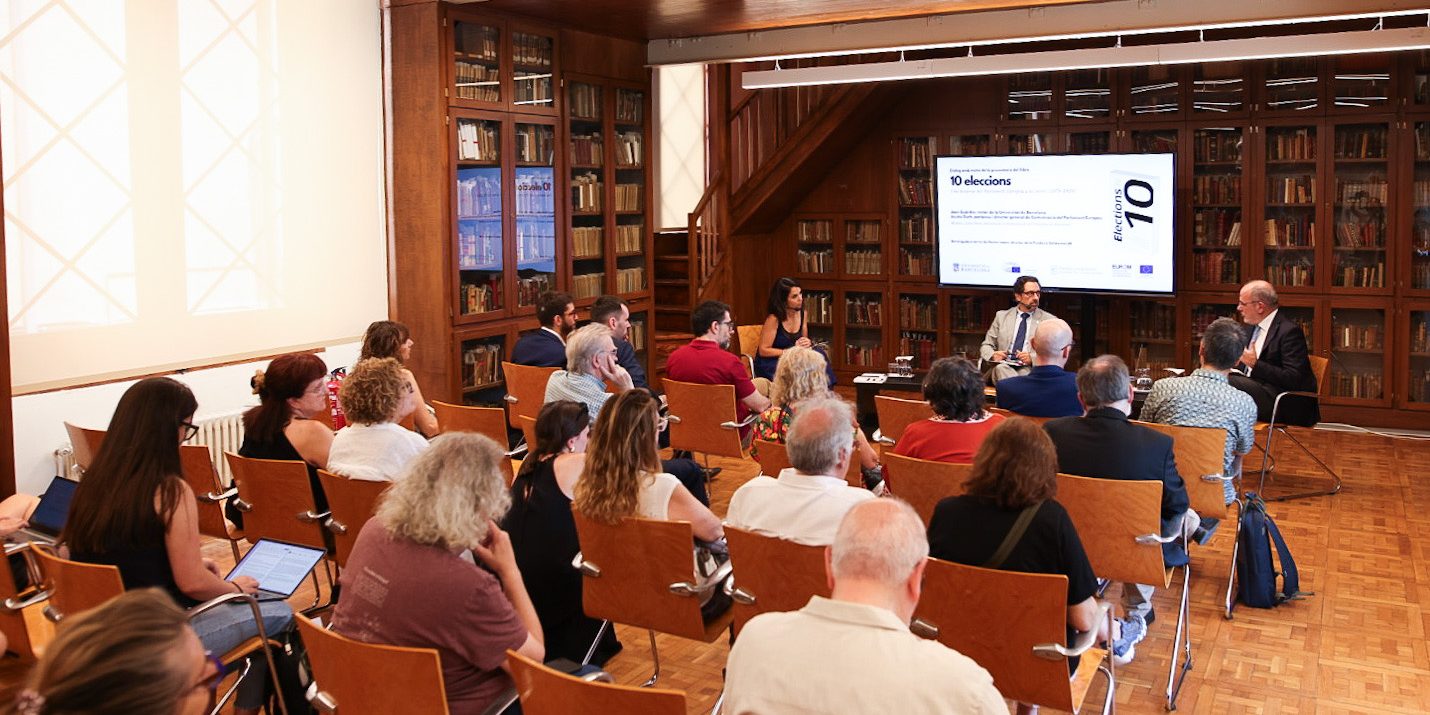Barcelona, July 09, 2024 – Jaume Duch, spokesperson and director of communication for the European Parliament, emphasized that the loss of memory is the most evident fragility facing Europe today. This reflection emerged during a dialogue at the University of Barcelona on the occasion of the presentation of the book “10 elections. A history of the European Parliament at the ballot box (1979-2024)”. This publication, by the European Observatory on Memories (EUROM) of the UB Solidarity Foundation and the Maison Jean Monnet, provided a springboard for an in-depth conversation between him and Joan Guàrdia, the rector of the University of Barcelona, about the evolution of the world’s largest transnational democracy and the challenges awaiting the upcoming tenth legislature of the European Parliament. During the talk, Joan Guàrdia, rector of the University of Barcelona, underscored that pan-European democracy is in a critical phase of consolidation and nothing can be taken for granted.
Xavier López, director of the UB Solidarity Foundation, opened the event by stressing the importance of historical memory in safeguarding European democratic values. Laura Rosel, the university’s director of communication, facilitated the dialogue between Guàrdia and Duch, which touched on the core ideas presented in the book’s 12 articles. These included the progression of democratic legitimacy in the European Parliament, the vulnerabilities posed by new populist movements, and the future challenges for the European Union.
Evolution of Democratic Legitimacy
Jaume Duch highlighted that the democratic principles applied at the state level must also be effectively implemented at the European level. “The voice of the people must be represented in European institutions,” he stated. Duch noted that each successive election has brought the European Parliament closer to the public, especially since the Lisbon Treaty in 2019, which elevated the Parliament’s legislative role and increased public awareness of its competencies. “There has been growing interest in European institutions in recent elections,” he concluded.
Joan Guàrdia pointed out that Brexit has reinforced the need to protect community identity. He explained that significant asymmetries within Europe complicate the establishment of consensus on democratic quality values, making it challenging to provide unified responses to various crises. “We are in a consolidation phase of pan-European democracy, and nothing can be taken for granted,” he asserted.
Fragilities and New Populisms
Addressing the topic of fragilities, Jaume Duch identified the loss of memory as a major threat to Europe. “The European Union cannot be understood without its past,” he said. Duch highlighted that the narrative of European campaigns has traditionally focused on functional benefits such as mobility and communication. However, with current threats to democratic quality both within and outside the EU, there is an urgent need to unify efforts to build a Europe that ensures well-being, security, and access to essential resources.
Discussing the rise of populism and the far right, Duch emphasized the importance of context. He noted that in countries where such groups have gained power, like Finland and Sweden, there has been a recent retreat of the far right in European elections. Nevertheless, he warned that these movements, having accepted the frameworks of European politics, now pose a threat from within by seeking to weaken these frameworks. “The danger is that they want to undermine the common project from within,” Duch added.
Future Challenges: Engaging Youth in Building Europe
Joan Guàrdia emphasized the public’s demand for a borderless Europe, while also noting the bureaucratic and legal obstacles that hinder the pan-European concept. He advocated for joint academic initiatives to offer young people opportunities to achieve their educational and professional goals within a unified Europe. “We must ensure that Europe facilitates the aspirations of young people,” he said.
Jaume Duch observed that young generations inherently identify with Europeanism, having grown up within a European framework. However, the dominance of member states in European politics still hampers the consolidation of European institutions. “In the coming years, we will see significant progress in making European institutions more visible and demonstrating that the EU can solve concrete problems, such as housing,” Duch concluded.
Pictures by Xènia Fuentes Lozano | University of Barcelona. More images available on Flickr.
Clipping – Presentation of the Book 10 Elections, by euromemories





